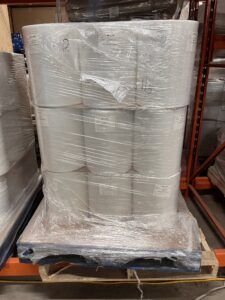Highlights
- FIBC bags are large, standardized bags often used for transporting bulk material like grain, crops, or other small objects. FIBC totes will fit on a pallet, but they are most often used with a forklift or tow motor that can pick them up via large “handles”. They generally are built to hold 1-1,500kg.
- Bulk totes are lighter and more flexible than large bins that might need to sit on pallets, and because they are made from woven materials, they can pack down to virtually nothing.
- They come in four broad Types (A-D), categorized by their ability to resist static electricity discharges that could be dangerous for flammable materials.
FIBC stands for “Flexible Intermediate Bulk Container”, but you probably know them as bulk bags, bulk tote bags, or simply FIBC bags. They’re used in many industries, but with so many varieties and types available today, it can be hard to know which one you need, and why.
In this article, we’ve compiled all you need to know about FIBC bulk bags and explained why the wrong FIBC bag could have disastrous consequences.
What are FIBC bags?
As their name implies, FIBC bags are flexible containers designed to transport dry bulk materials such as grains, construction materials, or dry chemicals. They’re generally made of plain woven polypropylene — a kind of plastic — which makes them incredibly versatile in terms of size, capacity, and shape.
They commonly come equipped with lifting loops, discharge spouts, and other features that enhance functionality depending on the bulk bags type or material. Chiefly speaking, a bulk bag fits perfectly on a wood pallet, and they’re crucial in industries like agriculture, chemicals, construction, and food processing.
Types of FIBC bags
There are four types of FIBC bags, and they’re categorized based on their ability to handle static electricity.
“What does static electricity have to do with bulk bags?” A valid question! Let’s go over some definitions first.
Static electricity is the buildup of electric charge on the surface of objects, which can suddenly discharge when in contact with another conductive material.
FIBC bags are frequently used for transporting flammable chemicals or even combustible materials like fertilizers and chemicals. Static electricity can accumulate quickly on bulk bags, because as the bags move, the powders or granules inside rub against each other and against the bag itself. As such, sudden discharges could ignite an entire bulk bag and burn down whole storehouses! With this in mind, you should know that some bulk bags are better prepared to handle static than others – though we recognize not every customer needs to worry about the flammability of their storage systems.
Let’s break it down.
Type A FIBC Bags
This is your standard FIBC bulk bag. They’re made from plain woven polypropylene fabrics, meaning they have no protection against static discharges. They usually carry around 1000kg and over 50 cubic feet of material.
These are essentially a large, square-to-rectangular plastic bag with hoops for handles. As we’ll see, other types of FIBC bags have other visual characteristics.
These should not be used when transporting combustible materials. They are, however, perfect and convenient for agricultural applications, such as transporting grains. We sell quite a few FIBC bags in Canada for this reason.
Type B FIBC Bags
Similar to Type A bulk bags, Type B bulk bags are specifically designed to prevent energetic brush discharges due to their low breakdown voltage, and even made from the same materials. The difference is that Type B bulk bags are made from plastic fabrics that have a low breakdown voltage, meaning that more electricity must build up for it to discharge.
In practice, this means that these bags are safer to use when handling certain flammable and combustible materials. However, Type B bags are not completely anti-static and should not be used in environments with flammable or conductive materials. Their surface is designed to remain conductive, meaning static can “find its way out” before causing trouble.
Still, you should know that they are not anti-static. They only reduce the chances of significant discharges.
What Are “Propagating Brush Discharges”?
The discharges you need watch out for? They’re called “propagating brush discharges”. In layman’s terms, once the static has built up, it will try to “leap” to the closest conductive material. If it actually reaches the object it can create an arch of plasma (yes, you read that right), which can ignite pretty much anything! It’s similar to how lightning forms as a result of electricity build-up in clouds.
This type of bulk bag is intended for use where there are no flammable gasses or vapors. You can use them to transport certain flammable powders, but only in specific conditions.
Type C FIBC Bags
Type C FIBC bags are made with nonconductive polypropylene fabrics similar to Type A, but with added strips of conductive materials such as carbon or stainless steel.
On examination, you’ll notice a kind of grid pattern on the sides of these bags: these are the electrically conductive threads. They help dissipate static charges through grounding, which literally means earthing the bag or placing it in contact with the ground.
The idea is that any electric charge on the surface can easily travel through the steel or carbon into the earth, preventing build-up. These kinds of bags can be called anti-static because they actively dissipate static charges. This meaningfully reduces the chances of a propagating brush discharge. These bulk bags are used in industries where static protection is essential. Chemicals, petrochemicals, pharmaceuticals, flammable solvents, and other materials are safe to transport with Type C bags if ground connection is ensured.
Type D Bulk Bags
The problem with Type C bulk bags is that people can forget to ground the bags. This error can seem small, but in the right conditions — imagine a factory full of chemicals — a little spark is all it takes for a disaster.
Constructed with antistatic fabrics, these bulk bags have full electrostatic protection without the need for grounding. This fabric not only dissipates all static electricity throughout the bag, but also protects against discharge and plasma arches.
On examination, you’ll notice they have a glossy, smooth finish, and none of the conductive materials that type C bulk bags have.
Type D bulk bags are as safe as bulk bags get. They’re used for transporting flammable products that require total insulation from any possible static discharges.
Are Bulk Bags Regulated?
Short answer: yes, very much so.
There are many regulations and safety standards for FIBC bulk bags, both national and international. These standards include guidelines set forth by organizations such as the International Electrotechnical Commission (IEC) and the National Fire Protection Association (NFPA).
However, the main international reference regarding FIBC bulk bags is the International Organization for Standardization’s ISO 21898, which includes quality-testing procedures for bulk bag manufacturers.

Bulk Bag Specifications
These are some of the standard specs for FIBC bulk bags.
Bulk Tote Capacity and Size
Capacity refers to the maximum weight a bag can hold. It typically ranges from 500kg to 2000kg, but the industry standard is 1000kg.
They also vary considerably in size, but these are some of the most common:
- Standard: Approximately 35 inches x 35 inches x 42 inches
- Large: Approximately 40 inches x 40 inches x 52 inches
- Extra-Large: Approximately 39 inches x 39 inches x 72 inches
It’s important to note that size is customizable and many industries have their standard go-to. Here at St Boniface’s Bags, we offer a 39x39x72 option which holds a maximum safe load of over 1000kg.
Bulk Tote Shape
There are four standard shapes among FIBC bulk bags:
- Four Panel Bags: The most common. Four panels are sewn together forming a sort of box shape, favored due to the fact it’s more comfortable for palletizing.
- U-Panel Bags: These bags are constructed using a long U-shaped panel that serves as three sides of the bag. The other two are sewn to the sides independently.
- Baffle Bags: They’re like the 4-panel bags but with additional baffles of walls that help maintain the bag’s structure when filled.
- Circular Bags: Here, a single piece of fabric forms a cylindrical shape, and a panel is sewn to the bottom. This shape minimizes the amount of sewn edges on the bag, reducing leakages.
While four-panel bags are what you probably think of when someone mentions bulk bags, other shapes are also useful for specific applications.
They all generally come with loops for lifting with a forklift or crane.
Additional Bulk Bag Features
Some bags come with duffle or spout tops for easier filling. The bottom panel might also come with a handy discharge spout, although both increase the chances of leaks. Your key takeaway here should be that FIBC bags are customizable, and the best tote bag vendors will probably have one that fits your needs.
Coated Bags vs Uncoated Bags
A coated bulk bag comes with a polypropylene liner or film that prevents moisture and dust from seeping into the bag’s contents. It also helps stop things from spilling out.
They’re used for transporting fine powders such as salt, detergent, or flour.
Uncoated bulk bags don’t have that liner, and air can pass through the woven plastic. They have the advantage of being more breathable and are generally used for coarser products that require ventilation, such as grains, coffee beans, or wood.
Order Bulk Bags Online with Ease
Ready to streamline your operations with high-quality bulk bags? We’ve been one of the top bag suppliers in Canada (and now the U.S.!) for over 70 years.
Click here to explore our range of bulk FIBC bag options, order online, or get in touch about bulk bag discounts. Call today!




